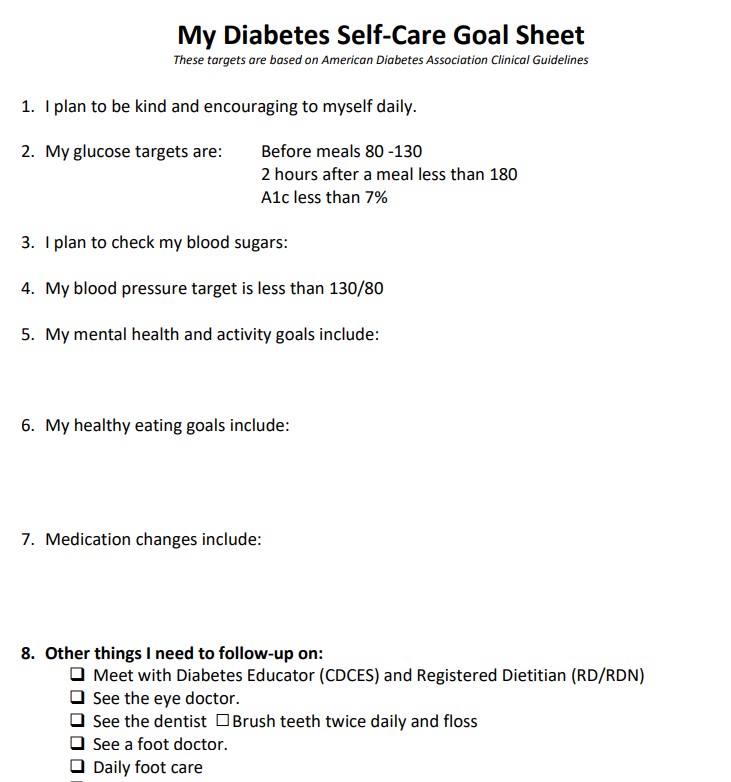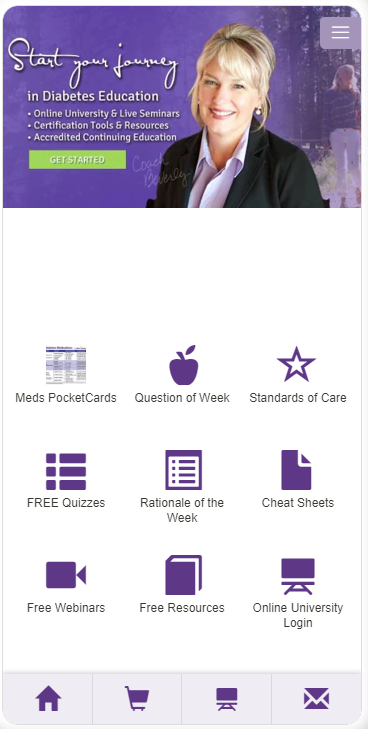Rationale of the Week | Accurate Meal Planning Approach?

For last week’s practice question, we quizzed participants on ADA recommendations for meal planning with diabetes. 41% of respondents chose the best answer. We want to clarify and share this important information, so you can pass it on to people living with diabetes and your colleagues, plus prepare for exam success!
Before we start though, if you don’t want any spoilers and haven’t tried the question yet, you can answer it below: Answer Question
Question: Which of the following diabetes meal planning recommendations is accurate according to ADA Standards of Care?
Answer Choices:
- Decrease intake of starchy vegetables.
- Limit carbs to 45 grams per meal.
- Eat 25 gms of fiber for every 1000 calories consumed.
- Avoid all concentrated sweets.
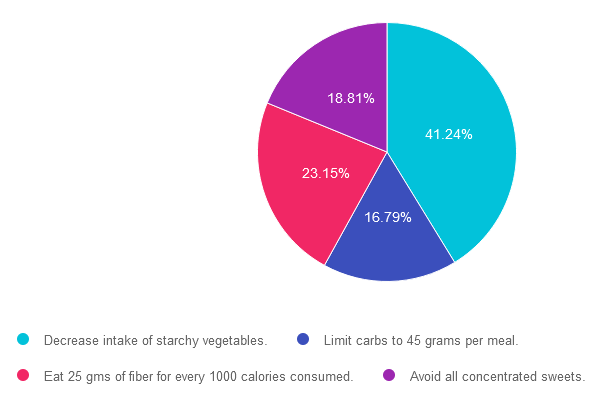
Getting to the Best Answer
If you are thinking about taking the certification exam, this practice test question will set you up for success. Test writers anticipate possible answers based on the details in the question. They will wave those “juicy answers” right under your nose. Your job is to weed through the particulars, pluck out the most important elements and choose the BEST answer.
Answer 1 is correct. 41.24% chose this answer. “Decrease intake of starchy vegetables.” YES, this is the BEST answer. According to ADA Standard 5, “Reducing overall carbohydrate intake for individuals with diabetes has demonstrated evidence for improving glycemia and may be applied in a variety of eating patterns that meet individual needs and preferences. Eating plans should emphasize nonstarchy vegetables, fruits, legumes, and whole grains, as well as dairy products, with minimal added sugars. However, “macronutrient distribution should be based on an individualized assessment of current eating patterns, preferences, and metabolic goals.”
Answer 2 is incorrect. 16.79% of you chose this answer. “Limit carbs to 45 grams per meal.” This is a juicy answer, but is an older approach that is no longer recommended. According to ADA Standard 5, “Evidence suggests that there is not an ideal percentage of calories from carbohydrate, protein, and fat for people with diabetes. However, macronutrient distribution should be based on an individualized assessment of current eating patterns, preferences, and metabolic goals.”
Answer 3 is incorrect. About 23.15% of respondents chose this. “Eat 25 gms of fiber for every 1000 calories consumed.” WOW, that would be a LOT of fiber. This is a great number to know for certification exams. According to ADA Standard 5, “People with diabetes and those at risk for diabetes are encouraged to consume a minimum of 14 g of fiber/1,000 kcal, with at least half of grain consumption being whole, intact grains, according to the Dietary Guidelines for Americans.”
Finally, Answer 4 is incorrect. 18.81% chose this answer. “Avoid all concentrated sweets.” Even if you are not sure what the best answer is at first, this answer has two red flags, the word “avoid” and the word “all”. Since the ADA recommends flexibility and tailoring to the individual, this would not be the best person-centered answer. According to ADA Standard 5, “Dietary guidance should emphasize the importance of a healthy dietary pattern as a whole rather than focusing on individual nutrients, foods, or food groups, given that individuals rarely eat foods in isolation.”
We hope you appreciate this week’s rationale! For more info on ADA Standard 5, click here. Thank you so much for taking the time to answer our Question of the Week and participate in this fun learning activity!
Want to learn more about this practice question?
Join us LIVE in San Diego for our DiabetesEd Training Conference
October 11-13th, 2023
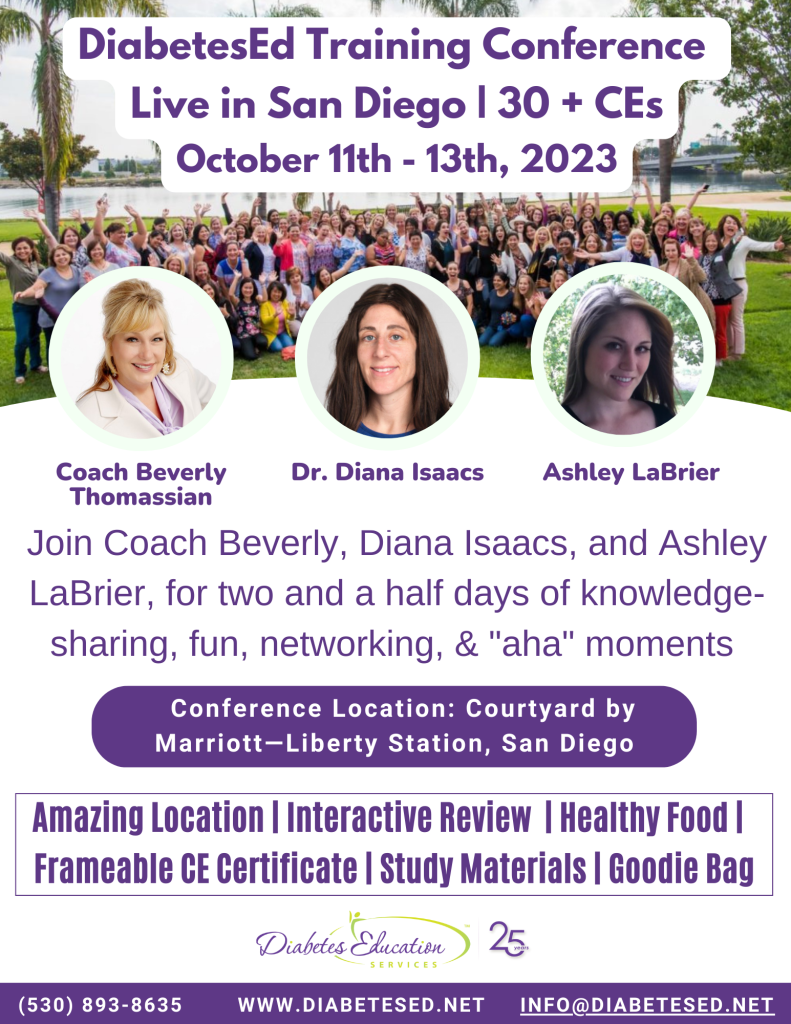
Two Registration Options
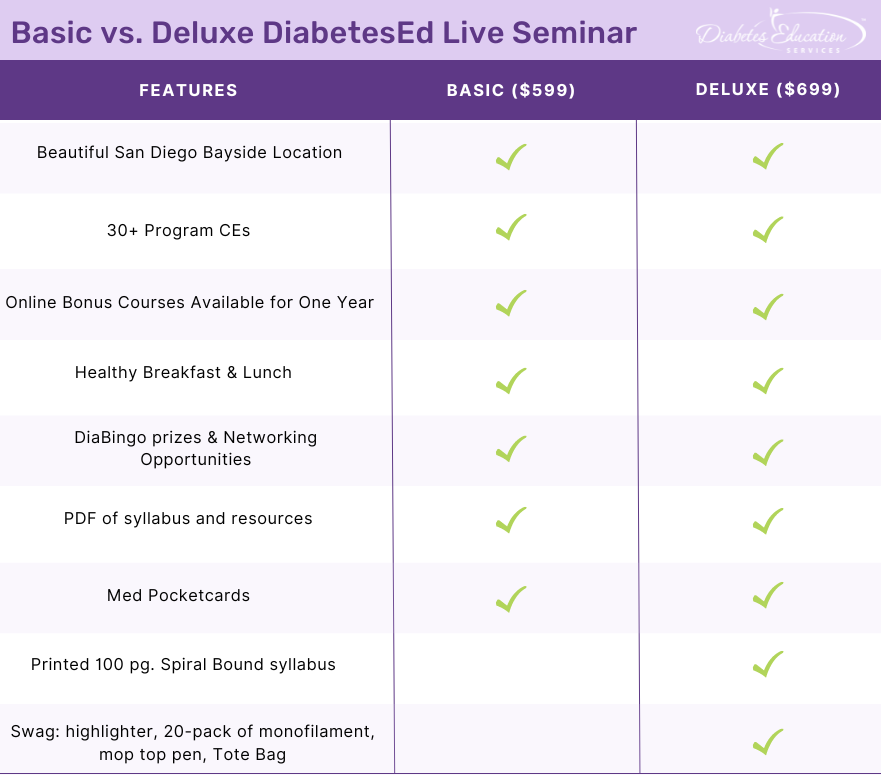
Join Coach Beverly and Team for two and a half days of knowledge-sharing, fun, networking, games with prizes, and “aha” moments in beautiful San Diego.
You don’t want to miss this one-of-a-kind learning opportunity. Get away from all those daily responsibilities and immerse yourself in a fun and intensive conference with plenty of networking opportunities.
Attendees will leave this conference with new tools and a more complete understanding of the latest advances in diabetes care, from medications to technology to Medical Nutrition Therapy!
Bring your colleagues and enjoy our friend discount.
Our team expertly translates the complex science of diabetes into understandable terms while keeping it real, practical, and fun.
Team of expert faculty includes:
- Diana Isaacs, PharmD, BCPS, BC-ADM, BCACP, CDCES – Educator of the Year, 2020
- Coach Beverly Thomassian, RN, MPH, CDCES, BC-ADM
- Ashley LaBrier, MS, RD, CDCES, Diabetes Program Coordinator
All hours earned count toward your CDCES Accreditation Information
Sign up for Diabetes Blog Bytes – we post one daily Blog Byte from Monday to Friday. And of course, Tuesday is our Question of the Week. It’s Informative and FREE! Sign up below!
The use of DES products does not guarantee the successful passage of the CDCES exam. CBDCE does not endorse any preparatory or review materials for the CDCES exam, except for those published by CBDCE.
Rationale of the Week | Can JR repeat Group Classes?

For last week’s practice question, we quizzed participants on reimbursement for group DSME classes through Medicare. 48% of respondents chose the best answer. We want to clarify and share this important information, so you can prepare for certification exams and pass it on to your colleagues.
Before we start though, if you don’t want any spoilers and haven’t tried the question yet, you can answer it below: Answer Question
Question:
JR is 73 years old and has Medicare Part A and B insurance. JR completed a Diabetes Self-Management Program at a local hospital when they were in their late 60s and tells you they want to repeat the group sessions since they have forgotten much of the information.
What is the most accurate response?
Answer Choices:
- Sounds great. Let’s get you enrolled in our group classes.
- Medicare only covers group sessions once in a lifetime.
- Good thinking. Medicare covers annual group training.
- Since your insurance won’t cover it again, you can attend for free.
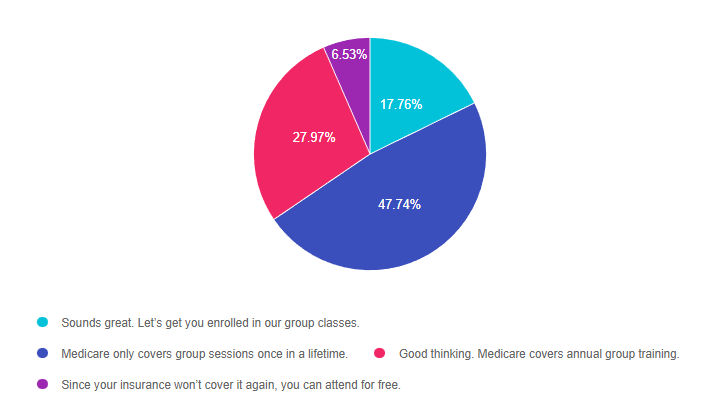
Getting to the Best Answer
If you are thinking about taking the certification exam, this practice test question will set you up for success since there are questions on Medicare Reimbursement. Test writers anticipate possible answers based on the details in the question. They will wave those “juicy answers” right under your nose. Your job is to weed through the particulars, pluck out the most important elements and choose the BEST answer.
Answer 1 is incorrect. 17.76% chose this answer. “Sounds great. Let’s get you enrolled in our group classes.” A very welcoming answer, but unfortunately, it’s not accurate. According to Medicare Reimbursement Guidelines, Initial Diabetes Self Management Training (DSMT) is a “once-in-a-lifetime” Medicare benefit. Since JR completed a Diabetes Self-Management Program at a local hospital when they were in their late 60s, we assume that Medicare was billed for the service, since Medicare coverage starts at age 65. For this reason, it is important to verify that the beneficiary has not received any initial DSMT in the past prior to the delivery of the initial DSMT.
Answer 2 is correct. 47.74% of you chose this answer. “Medicare only covers group sessions once in a lifetime.” YES, this is the best answer. According to Medicare Reimbursement Guidelines, Initial Diabetes Self Management Training (DSMT) is a “once-in-a-lifetime” Medicare benefit. Since JR completed a Diabetes Self-Management Program at a local hospital when they were in their late 60s, we assume that Medicare was billed for the service, since Medicare coverage starts at age 65. For this reason, it is important to verify that the beneficiary has not received any initial DSMT in the past prior to the delivery of the initial DSMT.
However, if the beneficiary has received initial DSMT paid by another health insurance company, he/she is still eligible to receive the 10 hours of initial DSMT as a Medicare benefit.
Answer 3 is incorrect. About 27.97% of respondents chose this. “Good thinking. Medicare covers annual group training.” Another tempting answer, but not accurate. According to Medicare Reimbursement Guidelines, Initial Diabetes Self Management Training (DSMT) is a “once-in-a-lifetime” Medicare benefit. Since JR completed a Diabetes Self-Management Program at a local hospital when they were in their late 60s, we assume that Medicare was billed for the service, since Medicare coverage starts at age 65. For this reason, it is important to verify that the beneficiary has not received any initial DSMT in the past prior to the delivery of the initial DSMT.
Finally, Answer 4 is incorrect. 6.53% chose this answer. “Since your insurance won’t cover it again, you can attend for free.” This answer is kind hearted, but not correct. For Medicare, initial DSMT group classes can only be provided once in a lifetime and should be billed to Medicare and not offered for free. Programs can create a self-pay/uninsured policy where services are discounted (must be consistent in charges and discounts etc.).
Here is a summary slide on Medicare Reimbursement Guidelines.
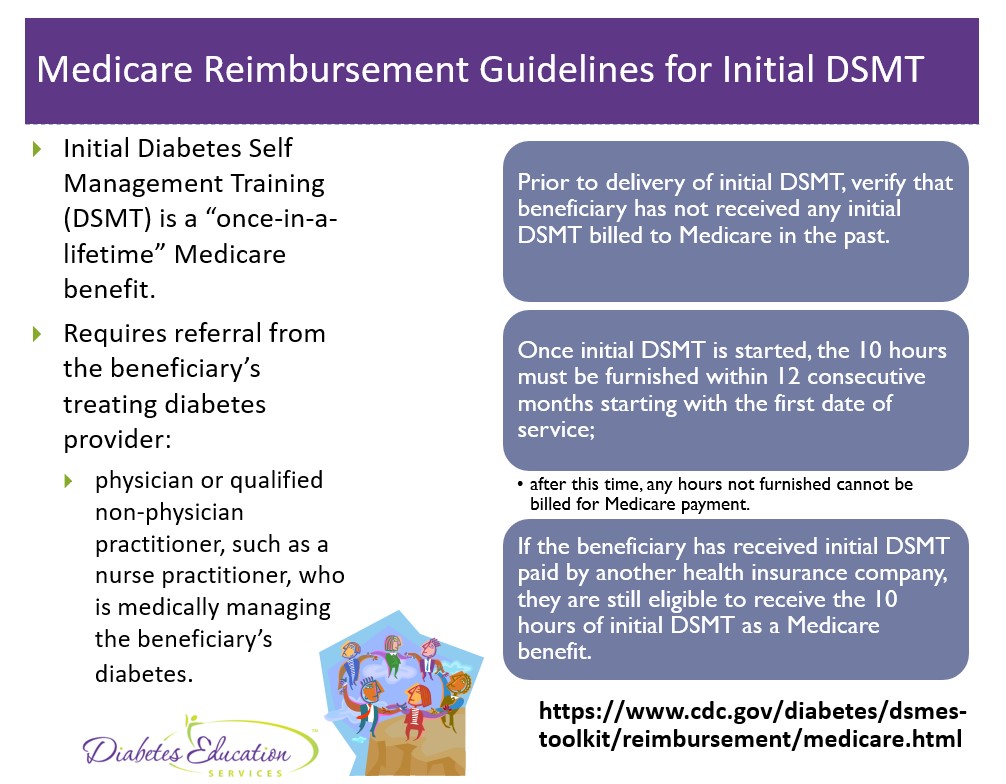
We hope you appreciate this week’s rationale! Thank you so much for taking the time to answer our Question of the Week and participate in this fun learning activity! You can read through the Medicare Reimbursement Guidelines here or the ADCES Info Sheet on DSMT Reimbursement join our Setting Up a Successful Diabetes Program & Medicare Reimbursement Webinar for more information.
Want to learn more about this practice question?
Join us LIVE in San Diego for our DiabetesEd Training Conference
October 11-13th, 2023

Two Registration Options

Join Coach Beverly and Team for two and a half days of knowledge-sharing, fun, networking, games with prizes, and “aha” moments in beautiful San Diego.
You don’t want to miss this one-of-a-kind learning opportunity. Get away from all those daily responsibilities and immerse yourself in a fun and intensive conference with plenty of networking opportunities.
Attendees will leave this conference with new tools and a more complete understanding of the latest advances in diabetes care, from medications to technology to Medical Nutrition Therapy!
Bring your colleagues and enjoy our friend discount.
Our team expertly translates the complex science of diabetes into understandable terms while keeping it real, practical, and fun.
Team of expert faculty includes:
- Diana Isaacs, PharmD, BCPS, BC-ADM, BCACP, CDCES – Educator of the Year, 2020
- Coach Beverly Thomassian, RN, MPH, CDCES, BC-ADM
- Ashley LaBrier, MS, RD, CDCES, Diabetes Program Coordinator
All hours earned count toward your CDCES Accreditation Information
Sign up for Diabetes Blog Bytes – we post one daily Blog Byte from Monday to Friday. And of course, Tuesday is our Question of the Week. It’s Informative and FREE! Sign up below!
The use of DES products does not guarantee the successful passage of the diabetes certification exams. CBDCE & ADCES does not endorse any preparatory or review materials for the certification exams, except for those published by CBDCE & ADCES.
Updated Self-Care Goal Sheet in English & Spanish
Question of the Week | Accurate Meal Planning Approach? | June 27, 2023

Which of the following diabetes meal planning recommendations is accurate according to ADA Standards of Care?
- Decrease intake of starchy vegetables.
- Limit carbs to 45 grams per meal.
- Eat 25 gms of fiber for every 1000 calories consumed.
- Avoid all concentrated sweets.
Click Here to Test your Knowledge
Want to learn more about this practice question?
Join us LIVE in San Diego for our DiabetesEd Training Conference
October 11-13th, 2023

Two Registration Options

Join Coach Beverly and Team for two and a half days of knowledge-sharing, fun, networking, games with prizes, and “aha” moments in beautiful San Diego.
You don’t want to miss this one-of-a-kind learning opportunity. Get away from all those daily responsibilities and immerse yourself in a fun and intensive conference with plenty of networking opportunities.
Attendees will leave this conference with new tools and a more complete understanding of the latest advances in diabetes care, from medications to technology to Medical Nutrition Therapy!
Bring your colleagues and enjoy our friend discount.
Our team expertly translates the complex science of diabetes into understandable terms while keeping it real, practical, and fun.
Team of expert faculty includes:
- Diana Isaacs, PharmD, BCPS, BC-ADM, BCACP, CDCES – Educator of the Year, 2020
- Coach Beverly Thomassian, RN, MPH, CDCES, BC-ADM
- Ashley LaBrier, MS, RD, CDCES, Diabetes Program Coordinator
All hours earned count toward your CDCES Accreditation Information
Sign up for Diabetes Blog Bytes – we post one daily Blog Byte from Monday to Friday. And of course, Tuesday is our Question of the Week. It’s Informative and FREE! Sign up below!
The use of DES products does not guarantee the successful passage of the CDCES exam. CBDCE does not endorse any preparatory or review materials for the CDCES exam, except for those published by CBDCE.
Rationale of the Week | Carrying Insulin is too much Hassle!

For last week’s practice question, we quizzed participants on carrying insulin. 69% of respondents chose the best answer. We want to clarify and share this important information, so you can pass it on to people living with diabetes and your colleagues, plus prepare for exam success!
Before we start though, if you don’t want any spoilers and haven’t tried the question yet, you can answer it below: Answer Question
Question: JL has new type 1 diabetes and their time in range is about 40%. They tell you that carrying insulin pens around on ice is such a hassle that they don’t give insulin before eating out.
What is the best response?
Answer Choices:
- Validate their feelings and suggest starting an insulin pump.
- Reassure them that with the right tools, they can keep their insulin at refrigerator temperature.
- Reinforce that insulin should never be frozen.
- Share accurate insulin pen storage guidelines with them.
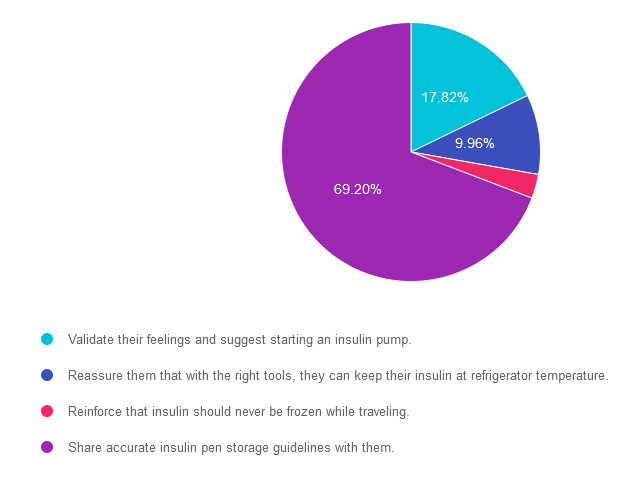
Getting to the Best Answer
If you are thinking about taking the certification exam, this practice test question will set you up for success. Test writers anticipate possible answers based on the details in the question. They will wave those “juicy answers” right under your nose. Your job is to weed through the particulars, pluck out the most important elements and choose the BEST answer.
Answer 1 is incorrect. 17.82% chose this answer. “Validate their feelings and suggest starting an insulin pump.” Although this answer is tempting, it’s not the best answer. The first part of the answer that suggests validating their feelings is accurate. However, we would want to explore accurate insulin pen storage options before suggesting switching over to an insulin pump. Please see our insulin storage guidelines cheat sheet for more information.
Answer 2 is incorrect. 9.96% of you chose this answer. “Reassure them that with the right tools, they can keep their insulin at refrigerator temperature.” Once the person uses the insulin pen for the first time, it no longer needs to be refrigerated. Each type of insulin pen has storage guidelines for insulin kept at room temperature. Please see our insulin storage guidelines cheat sheet for more information.
Answer 3 is incorrect. About 3.01% of respondents chose this. “Reinforce that insulin should never be frozen.” It is true that insulin should never be frozen, but this is not the best answer. We also want to follow up with accurate and safe insulin pen storage information.
Finally, Answer 4 is correct. 69.20% chose this answer. “Share accurate insulin pen storage guidelines with them.” Yes, this is the best answer! Once insulin pens are used for the first time, they can be stored at room temperature. Of course, users have to avoid letting them overheat at temperatures of 86 degrees Fahrenheit or greater or getting too cold. Either situation can damage the insulin molecule. Please see our insulin storage cheat sheet for more information and feel free to share this info with colleagues and people with diabetes alike.
We hope you appreciate this week’s rationale! Thank you so much for taking the time to answer our Question of the Week and participate in this fun learning activity!
ReVive 5 Diabetes Training Program
“ReVive 5 Program is the best program I have ever attended – should be required for all diabetes educators! Thank you so much for translating this research into practical approaches!!” – Sarah F.
Save $100! Enroll now to watch the webinar on-demand

ReViVE 5 Diabetes Training Program:
Unlocking Hidden Barriers to Diabetes Management
Enroll Now and Save $100!
Recorded & Ready to Watch
Addressing diabetes distress can be challenging, even for seasoned healthcare professionals.
We invite you to attend this hands-on training program that provides the essential steps to address diabetes distress combined with an innovative approach to glucose management.
Team of Experts: ReVive 5 is taught by a team of 3 Interdisciplinary Experts:
Lawrence Fisher, Ph.D., ABPP, Professor Emeritus, UCSF
Susan Guzman, PhD
Beverly Thomassian, RN, MPH, CDCES, BC-ADM
Accredited Training Program:
- 15.0 CEs – Includes the 7-hour ReVive 5 Training Program, Certificate, and 5 FREE bonus courses to supplement content.
- A comprehensive set of assessment tools, educational materials, log sheets, and resources.
“ReVive 5” breathes new life into our relationship with diabetes, bringing a fresh perspective to both the person with diabetes and the provider.
All hours earned count toward your CDCES Accreditation Information
Sign up for Diabetes Blog Bytes – we post one daily Blog Byte from Monday to Friday. And of course, Tuesday is our Question of the Week. It’s Informative and FREE! Sign up below!
The use of DES products does not guarantee the successful passage of the CDCES exam. CBDCE does not endorse any preparatory or review materials for the CDCES exam, except for those published by CBDCE.
Sulfonylurea Sold as “Street Valium”
At the recent gathering of the American Association of Clinical Endocrinology meeting, a provider shared a surprising case study of life-threatening hypoglycemia in a 33-year-old without diabetes.

Unknowingly, this individual thought they were purchasing “street Valium”, but was sold the potent sulfonylurea, glyburide, instead. As a result, their blood sugar dropped to 18 mg/dL, causing unconsciousness and the need for emergent medical assistance. This individual had purchased two unmarked, light blue pills on the street, which they thought were Valiums but turned out to be glyburide. Since sulfonylureas aren’t detected in urine toxicology screens, the symptoms of hypoglycemia may be mistakenly attributed to other causes or drugs. The only way to detect the presence of sulfonylureas is through blood tests.
“Physicians should be aware of this possibility and consider intentional or unintentional sulfonylurea abuse, with or without other drugs,” Amanda McKenna, MD, a first-year endocrinology fellow at the Mayo Clinic, Jacksonville, Florida, and colleagues say in a poster presented at the American Association of Clinical Endocrinology (AACE) Annual Meeting 2023.
Glyburide has a similar appearance to street valium. It is cheaper and easier to acquire than Valium (a controlled substance) which explains its appearance in illicit drug sales over the past two decades. However, since glyburide stimulates sustained insulin secretion, consumption can lead to life-threatening prolonged hypoglycemia. In addition, the person consuming it may attribute their symptoms to the “Valium” they thought they were taking and is vulnerable to severe hypoglycemia.
If hypoglycemia is detected, D50W is commonly used to immediately raise glucose levels. But, since sulfonylurea has a long half-life, blood sugars may plummet again. The most effective treatment to sustain blood sugars for those with glyburide toxicity is the administration of octreotide. Octreotide, a long-acting somatostatin agonist, reverses the insulin-releasing effect of sulfonylureas on pancreatic beta cells, resulting in diminished insulin secretion.
Cases like these have been reported for the past two decades. But how many incidents are we missing? Sharing this information with first responders, emergency department staff, and our communities can save lives.
Read more here
NEW: Everything Bundle
For the first time, we are offering all of our Online Courses and Training Programs in ONE bundle!
Now on sale, Enroll Now & Save $100!
40+ online courses | 85+ CEs
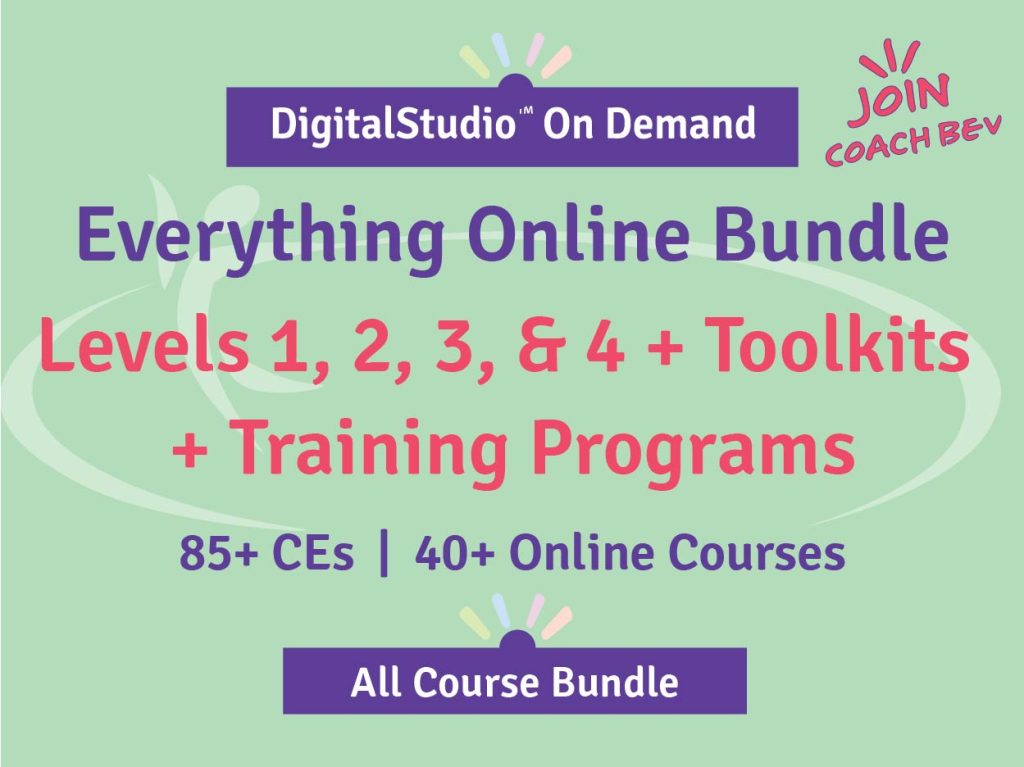
This exclusive Everything Bundle provides access to ALL of our Online University Courses and Training Programs. This bundle is perfect for those who need CEs to renew their license or diabetes certification or are looking for a comprehensive update on all topics of diabetes.
Subscribers enjoy over 40 courses taught by Coach Beverly and her team of experts on topics ranging from Diabetes Distress to MNT, Technology to Pattern Management with a focus on providing evidence-based, person-centered diabetes care.
All hours earned count toward your CDCES Accreditation Information
Sign up for Diabetes Blog Bytes – we post one daily Blog Byte from Monday to Friday. And of course, Tuesday is our Question of the Week. It’s Informative and FREE! Sign up below!
The use of DES products does not guarantee the successful passage of the CDCES exam. CBDCE does not endorse any preparatory or review materials for the CDCES exam, except for those published by CBDCE.
Question of the Week | Can JR repeat Group Classes?

JR is 73 years old and has Medicare Part A and B insurance. JR completed a Diabetes Self-Management Program at a local hospital when they were in their late 60s and tells you they want to repeat the group sessions since they have forgotten much of the information.
What is the most accurate response?
- Sounds great. Let’s get you enrolled in our group classes.
- Medicare only covers group sessions once in a lifetime.
- Good thinking. Medicare covers annual group training.
- Since your insurance won’t cover it again, you can attend for free.
Click Here to Test your Knowledge
Want to learn more about this practice question?
Join us LIVE in San Diego for our DiabetesEd Training Conference
October 11-13th, 2023

Two Registration Options

Join Coach Beverly and Team for two and a half days of knowledge-sharing, fun, networking, games with prizes, and “aha” moments in beautiful San Diego.
You don’t want to miss this one-of-a-kind learning opportunity. Get away from all those daily responsibilities and immerse yourself in a fun and intensive conference with plenty of networking opportunities.
Attendees will leave this conference with new tools and a more complete understanding of the latest advances in diabetes care, from medications to technology to Medical Nutrition Therapy!
Bring your colleagues and enjoy our friend discount.
Our team expertly translates the complex science of diabetes into understandable terms while keeping it real, practical, and fun.
Team of expert faculty includes:
- Diana Isaacs, PharmD, BCPS, BC-ADM, BCACP, CDCES – Educator of the Year, 2020
- Coach Beverly Thomassian, RN, MPH, CDCES, BC-ADM
- Ashley LaBrier, MS, RD, CDCES, Diabetes Program Coordinator
All hours earned count toward your CDCES Accreditation Information
Sign up for Diabetes Blog Bytes – we post one daily Blog Byte from Monday to Friday. And of course, Tuesday is our Question of the Week. It’s Informative and FREE! Sign up below!
The use of DES products does not guarantee the successful passage of the CDCES exam. CBDCE does not endorse any preparatory or review materials for the CDCES exam, except for those published by CBDCE.
Question of the Week | Carrying Insulin is too much Hassle!

JL has new type 1 diabetes and their time in range is about 40%. They tell you that carrying insulin pens around on ice is such a hassle that they don’t give insulin before eating out.
What is the best response?
- Validate their feelings and suggest starting an insulin pump.
- Reassure them that with the right tools, they can keep their insulin at refrigerator temperature.
- Reinforce that insulin should never be frozen while traveling.
- Share accurate insulin pen storage guidelines with them.
Click Here to Test your Knowledge
ReVive 5 Diabetes Training Program
“ReVive 5 Program is the best program I have ever attended – should be required for all diabetes educators! Thank you so much for translating this research into practical approaches!!” – Sarah F.
Save $100! Enroll now to watch the webinar on-demand

ReViVE 5 Diabetes Training Program:
Unlocking Hidden Barriers to Diabetes Management
Enroll Now and Save $100!
Recorded & Ready to Watch
Addressing diabetes distress can be tricky, even for seasoned healthcare professionals.
We invite you to attend this hands-on training program that provides the essential steps to address diabetes distress combined with an innovative approach to glucose management. Our experts offer realistic strategies to address diabetes distress that you can immediately apply to your practice setting. Plus, the ReVive 5 Program provides a breadth of tools and resources to create more meaningful connections with people with diabetes.
Team of Experts: ReVive 5 is taught by a team of 3 Interdisciplinary Experts:
- Lawrence Fisher, Ph.D., ABPP, Professor Emeritus, UCSF
- Susan Guzman, PhD
- Beverly Thomassian, RN, MPH, CDCES, BC-ADM
Accredited Training Program:
- 15.0 CEs – Includes the 7-hour ReVive 5 Training Program, Certificate, and 5 FREE bonus courses to supplement content.
- A comprehensive set of assessment tools, educational materials, log sheets, and resources.
“ReVive 5” breathes new life into our relationship with diabetes, bringing a fresh perspective to both the person with diabetes and the provider.
CDCES Basic Prep Bundle
30+ Online Courses | 50+ CEs

This bundle is specifically designed for healthcare professionals who are studying for the Certified Diabetes Care and Education Specialist (CDCES) exam.
The online bundle includes Level 1, Level 2, and Level 3 (Boot Camp), plus online Technology & Test-Taking Toolkits.
BC-ADM Deluxe Prep Bundle
35 online courses | 50+ CEs
This bundle is specifically designed for healthcare professionals who are studying for the Board Certified in Advanced Diabetes Management (BC-ADM) exam.
This bundle includes our Level 2, Level 3 (Boot Camp), and Level 4, plus online Technology & Test-Taking Toolkits.

NEW: Everything Bundle
40+ online courses | 85+ CEs

This exclusive Everything Bundle provides access to ALL of our Online University Courses and Training Programs. This bundle is perfect for those who need CEs to renew their license or diabetes certification or are looking for a comprehensive update on all topics of diabetes.
Subscribers enjoy over 40 courses taught by Coach Beverly and her team of experts on topics ranging from Diabetes Distress to MNT, Technology to Pattern Management with a focus on providing evidence-based, person-centered diabetes care.
All hours earned count toward your CDCES Accreditation Information
Sign up for Diabetes Blog Bytes – we post one daily Blog Byte from Monday to Friday. And of course, Tuesday is our Question of the Week. It’s Informative and FREE! Sign up below!
The use of DES products does not guarantee the successful passage of the diabetes certification exams. CBDCE & ADCES does not endorse any preparatory or review materials for the certification exams, except for those published by CBDCE & ADCES.



